I had an interesting discussion with an old friend not too long ago — he was planning a fishing trip with his long-time fishing buddy, who’s gracefully aging and is now into his 80s.
“He’s getting up there, and I’m getting up there, too,” my friend, who’s now into his 60s, said. “His eyesight is failing, and I’m losing my hearing. It’s getting comical when we’re on the water together. For now, we can laugh about it, but it’s starting to get a little annoying.”
Tell me about it. I’m damn near deaf. I’ve got a pair of serviceable hearing aids that work pretty well when I can focus on the sounds right in front of me, but in crowded situations, like restaurants, or big gatherings, they’re hopeless. Which means I just do a lot of nodding and smiling and generally pretending that I know what’s going on. Sometimes it works, and sometimes I feel like Brick Tamland, Steve Carell’s empty-headed character in Anchorman.
Sensory loss aside, my buddy explained to me that the blind-deaf double-whammy that he and his older fishing friend are dealing with has changed the way they fish. For instance, they rarely ever worry about dry-fly fishing, particularly when the flies involved are on the small side.
“We can’t see ‘em,” he said. “Even I can’t see ‘em. But he really can’t see ‘em. So, honestly, we do a lot of nymphing under indicators.”
And then he said something else that got to me.
“And we’re fishing a lot of lakes.”
Lakes? What does that have to do with going blind and deaf?
“Everything slows down on lakes, and it’s so much easier to find your fly on flat water when your eyesight is failing,” he said. “And, without the river noise, I can usually hear what my guide is saying, or what my buddy is saying. It might have saved our fishing, to be honest.”
Remove an element and focus
Interesting, I thought. I never really equated lake fishing to the challenges of aging, and I’m certain that most anglers who love to fish lakes don’t do it out of self-defense against failing faculties. But I had to admit, his logic seemed sound. And, in recent years, I have found myself enjoying flat-water fishing just as much, if not more, than chasing big fish in complex rivers.
First, I’m a total pike junky — any chance I get to go after big northerns in the boreal north, I jump at it. But it’s more than that. Over the last few years, I’ve enjoyed some fantastic trout fishing on lakes, too.
Just last fall, I enjoyed a terrific day of fishing on Lago Brown in Chilean Patagonia. This gorgeous lake ringed by the San Lorenzo Mountains gave up some seriously nice rainbows as our guide, Nico Vargas, pushed us around the edges in search of cruising fish. A few years prior and a bit farther north, I spent a couple of fantastic days targeting big, cruising browns while fishing with a buddy on a couple of stunning Andean lakes. Sight-fishing to cruising trout was every bit as satisfying as dry-fly fishing the Rio Simpson or the Paloma.
And, as it turned out, the same held true for Lago Brown. Nico would slowly row the boat around the edges of the beautiful lake, and, when we spied big, cruising fish, we’d make a cast. Sometimes the casts were 20 feet long. Sometimes 60 feet, depending on where the boat was in contrast with the jagged shoreline where the fish were generally congregating. Casts had to be fairly precise, generally on target, and it helped to be able to see the fish.
And, for me, it helped to be able to hear Nico as he pointed out fish that I might have otherwise missed. He didn’t have to shout over the torrent of moving water, and I could stand quite comfortably in the bow of the boat without having to anticipate the next rapid or the next rock, or look for the next bit of structure to put my fly on as we bounced down the river. My buddy is right. Things do slow down on lakes. By removing one simple element — moving water and all the complexities it adds to a fishing situation — I was able to really dial in my “fish eye” and focus on finding targets I could cast to.

Different fishing
A few times over the last several years, I’ve found myself on boats motoring across lakes. Each time, I regretfully let a friend, guide, or a lodge owner “convince” me that I was going to have an excellent day of fishing, even if I wasn’t going to be fishing a stunning rainforest river or a crystal clear spring creek that flows across a verdant mountain meadow. Moving water is still my thing, but sometimes, when things just don’t work out thanks to high water, unsettled weather or whatever, I’ve allowed myself to be talked into a day of lake fishing.
Several years back, I and a group of friends were checking out the rivers and streams of the Centennial Mountains that sit just over the pass from Island Park. One afternoon, one of my buddies wandered over to me with his copy of the Montana version of De Lorme’s Atlas and Gazetteer. With the map open to the page that depicted our location at the time.
“See this?” he asked, as he ran his finger along a thin, blue line up into the mountains. His finger came to rest on a hidden mountain lake. “It says there’s a short trail along the creek up to the lake. I bet there are some nice fish in there.”
“A lake?” I asked. Here we were, pretty much catching cutthroats — and some nice ones, too — at will, and this snapperhead wants to wander down a lonely trail to a lake. On a hunch.
A few of us did have float tubes with us, and after a few minutes of kind of psyching myself up, I agreed to some stillwater fishing. Not an hour later, after parking myself at the mouth of a gorgeous little cove, and after going with the usual “lake” approach for me at the time — I’d switched to a full-sink outfit and was slowly retrieving a leech pattern as close to the bottom as I could get — I started to see some things that I hadn’t seen on first blush. True to course, things were slowing down. I wasn’t deafened by the roar of the high-mountain creek, and I was spending more time watching what was happening than I might have, had I been rock-hopping up the stream, laser-focused on this pocket or that seam or that overhang.
And then, as if someone switched on the lights, I started to see cruising trout. And big ones, too. I quickly reeled in my searching pattern, changed the spool to a floating line, and tied on an obnoxious size 10 Adams. Big and fluffy, there’s no way I’d miss it, even as the light was starting to fade, and, frankly, there was no way the lake’s cruising rainbows would miss it, either.
For the next hour, I enjoyed easily the best fishing I had all that summer. And all because I’d agreed to do something I didn’t think I really enjoyed. And, as I’ve had to remind myself over the years, I like lake fishing. I just don’t do it enough to remember that I like it.
Open your mind and let the lake fish in
After recalling that incredible trip to the Montana high country, and especially after my November trip to Patagonia, I’m officially giving up on lake-fishing reticence. I’m embracing the discipline, particularly when there are shots at cruising trout. See a fish. Cast. Catch the fish.
When we’d hiked out with our wet float tubes at sunset that evening in Montana, all I could do was look at my buddy and nod.
“Let me see that map,” I said. “I bet there’s another lake we could try tomorrow.”

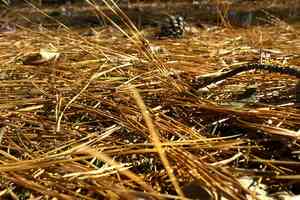


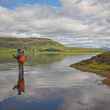
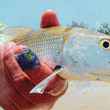
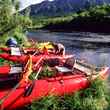

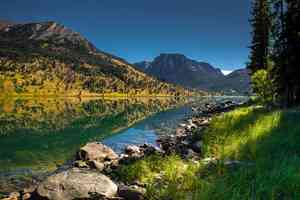
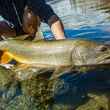




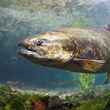
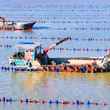
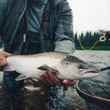
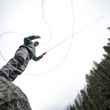






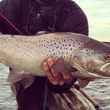

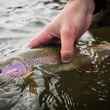
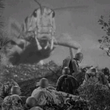
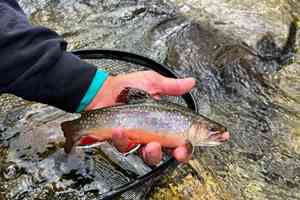

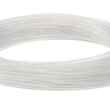

Comments